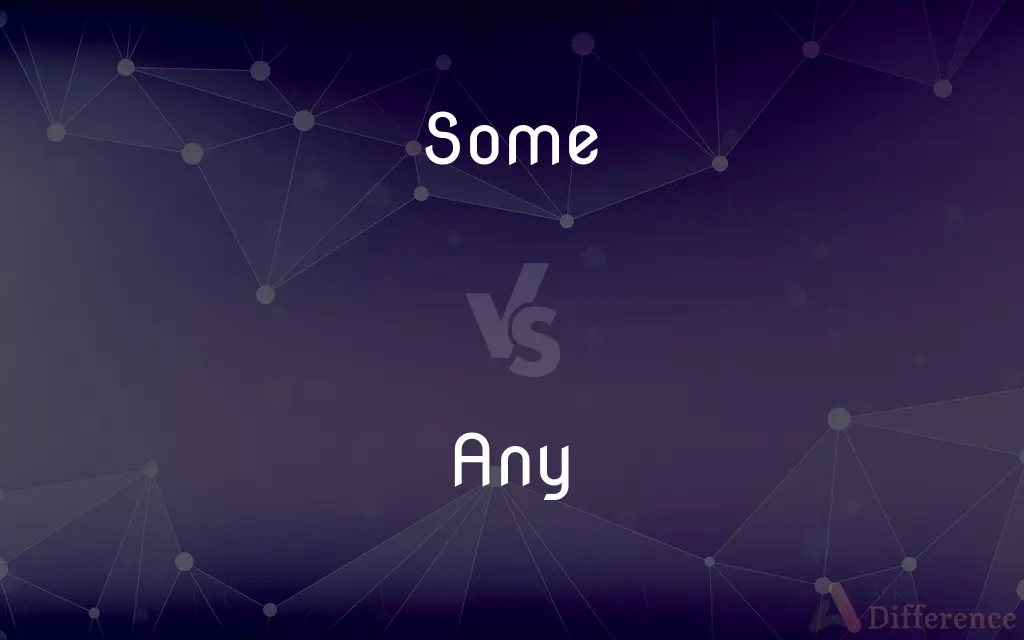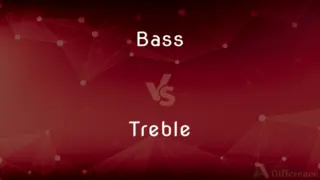Some vs. Any — What's the Difference?
Edited by Tayyaba Rehman — By Maham Liaqat — Updated on April 16, 2024
"Some" often implies a limited, unspecified quantity, suitable for affirmative contexts, while "any" suggests an unlimited or general sense, used in questions and negatives.

Difference Between Some and Any
Table of Contents
ADVERTISEMENT
Key Differences
"Some" is used to refer to a specific, albeit unspecified, amount of something in affirmative statements (e.g., "I have some money"). On the other hand, "any" is more frequently used in questions or negative constructions, suggesting a general or unlimited quantity (e.g., "Do you have any money?").
In positive statements, "some" conveys the idea of a limited but adequate quantity, which can be quantifiable or non-quantifiable (e.g., "She bought some apples"). Whereas "any" in positive statements often implies any amount or even every amount, typically with a conditional or hypothetical tone (e.g., "If you find any errors, let me know").
When offering or requesting, "some" implies a part of a whole, suggesting a more generous or hopeful attitude (e.g., "Would you like some coffee?"). Conversely, "any" can imply minimal expectation or an open-ended option in offers and requests (e.g., "Can I get you any help?").
In expressions of quantity, "some" might indicate a more substantial or noticeable amount (e.g., "There are some cookies left"). In contrast, "any" often denotes the presence or absence of any quantity, emphasizing inclusivity or lack (e.g., "Are there any cookies left?").
In negative sentences, "some" is rarely used and typically sounds awkward or incorrect, focusing instead on positive assertions (e.g., "I don't have some money" is incorrect). In these contexts, "any" is the correct choice, indicating a lack in general terms (e.g., "I don't have any money").
ADVERTISEMENT
Comparison Chart
Usage in Statements
Affirmative, specific
Questions, negative, general
Implication of Quantity
Limited, unspecified
Any or none, general
Common Contexts
Offers, hopeful statements
Requests, conditional clauses
Example in Positive Sentence
"She has some friends."
"She can choose any book."
Example in Negative Sentence
Incorrect (e.g., "He doesn't have some ideas.")
Correct (e.g., "He doesn't have any ideas.")
Compare with Definitions
Some
An amount or number of something that is not specified.
She has some ideas on the subject.
Any
Used in comparisons for emphasizing a lack of difference.
She can't run any faster.
Some
Used to refer to someone or something that is unknown or unspecified.
He met some friend of yours.
Any
Used to refer to one or some of a thing or number of things, no matter how much or many.
Do you have any money?
Some
Used informally to express admiration or surprise.
That's some car you've got!
Any
Whichever or whatever one chooses.
You can select any color you like.
Some
A certain unspecified or unknown quantity of something.
I need some paper for the printer.
Any
Used to suggest a lack or zero quantity of something.
He doesn't have any sense.
Some
Used to indicate a remarkable or impressive degree or extent.
He has some nerve showing up here!
Any
At all; in some degree (used for emphasis).
I don't like it any better than you do.
Some
An unspecified amount or number of
He played some records for me
I made some money running errands
Any
One or some; no matter which
Take any book you want. Do you have any information on ancient Roman architecture?.
Some
Used to refer to someone or something that is unknown or unspecified
I was talking to some journalist the other day
He's in some kind of trouble
There must be some mistake
Any
No matter how many or how few; some
Are there any oranges left?.
Some
(used with a number) approximately
Some thirty different languages are spoken
Any
No matter how much or how little
Is there any milk left?.
Some
(pronounced stressing ‘some’) a considerable amount or number of
I've known you for some years now
He went to some trouble
Any
Every
Any dog likes meat.
Some
(pronounced stressing ‘some’) at least a small amount or number of
He liked some music but generally wasn't musical
Any
Exceeding normal limits, as in size or duration
The patient cannot endure chemotherapy for any length of time.
Some
(pronounced stressing ‘some’) expressing admiration of something notable
That was some goal
Any
To any degree or extent; at all
The patient didn't feel any better after the treatment.
Some
An unspecified number or amount of people or things
If you want whisky I'll give you some
Here are some of our suggestions
Any
To even the slightest extent, at all.
I will not remain here any longer.
If you get any taller, you'll start having to duck through doorways!
That doesn't bother me any. (chiefly US usage)
Some
(pronounced stressing ‘some’) at least a small amount or number of people or things
Surely some have noticed
Any
(negative polarity item) One at all; at least one; at least one kind of; some; a positive quantity of.
Do you have any biscuits?
Do you have any food?
I haven't got any money.
It won't do you any good.
Some
To some extent; quite a lot
He needs feeding up some
Any
No matter what kind.
Choose any items you want.
Any person may apply.
Press any key to continue.
Some
Being an unspecified number or quantity
Some people came into the room. Would you like some sugar?.
Any
Any thing(s) or person(s).
Any may apply.
Some
Being a portion or an unspecified number or quantity of a whole or group
He likes some modern sculpture but not all.
Any
One indifferently, out of an indefinite number; one indefinitely, whosoever or whatsoever it may be.
No man knoweth the Son, but the Father; neither knoweth any man the Father, save the Son.
Some
Being a considerable number or quantity
She has been directing films for some years now.
Any
Some, of whatever kind, quantity, or number; as, are there any witnesses present? are there any other houses like it?
If any of you lack wisdom, let him ask of God, . . . and it shall be given him.
That if he found any of this way, whether they were men or women, he might bring them bound unto Jerusalem.
Some
Unknown or unspecified by name
Some man called.
Any
To any extent; in any degree; at all.
You are not to go loose any longer.
Before you go any farther.
Some
(Logic) Being part and perhaps all of a class.
Any
(in negative statements) either every little or very great but unspecified;
Can't stand any noise
Could not endure chemotherapy for any length of time
Some
(Informal) Remarkable
She is some skier.
Any
One or some or every or all without specification;
Give me any peaches you don't want
Not any milk is left
Any child would know that
Pick any card
Any day now
Cars can be rented at almost any airport
At twilight or any other time
Beyond any doubt
Need any help we can get
Give me whatever peaches you don't want
No milk whatsoever is left
Some
Approximately; about
Some 40 people attended the rally.
Any
To any degree or extent;
It isn't any better
Some
(Informal) Somewhat
Some tired.
Some
A certain number, at least two.
Some enjoy spicy food, others prefer it milder.
Some
An indefinite quantity.
Can I have some of them?
Some
An indefinite amount, a part.
Please give me some of the cake.
Everyone is wrong some of the time.
Some
A certain proportion of, at least two.
Some people like camping.
Some
An unspecified quantity or number of.
Would you like some grapes?
Some
An unspecified amount of (something uncountable).
Would you like some water?
After some persuasion, he finally agreed.
Some
A certain, an unspecified or unknown.
I've just met some guy who said he knew you.
The sequence S converges to zero for some initial value v.
Some
A considerable quantity or number of.
He had edited the paper for some years.
He stopped working some time ago.
Some
Approximately, about (with a number).
She had been employed at that company for some five years now.
There were only some three or four cars in the lot at the time.
Some
(informal) A remarkable.
He is some acrobat!
Some
Of a measurement: approximately, roughly.
I guess he must have weighed some 90 kilos.
Some 30,000 spectators witnessed the feat.
Some 4,000 acres of land were flooded.
Some
(dialect) To a certain extent, or for a certain period.
Some
Consisting of a greater or less portion or sum; composed of a quantity or number which is not stated; - used to express an indefinite quantity or number; as, some wine; some water; some persons. Used also pronominally; as, I have some.
Some theoretical writers allege that there was a time when there was no such thing as society.
Some
A certain; one; - indicating a person, thing, event, etc., as not known individually, or designated more specifically; as, some man, that is, some one man.
Some man praiseth his neighbor by a wicked intent.
Most gentlemen of property, at some period or other of their lives, are ambitious of representing their county in Parliament.
Some
Not much; a little; moderate; as, the censure was to some extent just.
Some
About; near; more or less; - used commonly with numerals, but formerly also with a singular substantive of time or distance; as, a village of some eighty houses; some two or three persons; some hour hence.
The number slain on the rebel's part were some two thousand.
Some
Considerable in number or quantity.
On its outer point, some miles away.The lighthouse lifts its massive masonry.
Some
Certain; those of one part or portion; - in distinction from other or others; as, some men believe one thing, and others another.
Some [seeds] fell among thorns; . . . but other fell into good ground.
Some
A part; a portion; - used pronominally, and followed sometimes by of; as, some of our provisions.
Your edicts some reclaim from sins,But most your life and blest example wins.
Some to the shores do fly,Some to the woods, or whither fear advised.
Some in his bed, some in the deep sea.
Some
Quantifier; used with either mass nouns or plural count nouns to indicate an unspecified number or quantity;
Have some milk
Some roses were still blooming
Having some friends over
Some apples
Some paper
We have no bananas
No eggs left and no money to buy any
Have you no decency?
Did it with no help
I'll get you there in no time
Some
Unknown or unspecified;
Some lunatic drove into my car
Some man telephoned while you were out
Some day my prince will come
Some enchanted evening
Some
Relatively many but unspecified in number;
They were here for some weeks
We did not meet again for some years
Some
Remarkable;
That was some party
She is some skier
Some
Relatively much but unspecified in amount or extent;
We talked for some time
He was still some distance away
Some
(of quantities) imprecise but fairly close to correct;
Lasted approximately an hour
In just about a minute
He's about 30 years old
I've had about all I can stand
We meet about once a month
Some forty people came
Weighs around a hundred pounds
Roughly $3,000
Holds 3 gallons, more or less
20 or so people were at the party
Common Curiosities
Is it ever correct to use "some" in a question?
Yes, "some" can be used in questions that are offers or requests, e.g., "Would you like some coffee?"
Can "some" and "any" be used interchangeably?
No, "some" is typically used in affirmative sentences implying a limited amount, whereas "any" is used in questions and negatives implying unlimited or zero quantity.
Why is "some" not suitable in negative sentences?
"Some" implies a specific part of a whole, which contradicts the general negation implied by "any" in negative sentences.
Are there exceptions to using "some" in questions?
Yes, "some" can be used in questions when they are meant as offers or polite requests, e.g., "Would you like some help?"
How does the use of "some" and "any" change in formal vs. informal contexts?
In formal contexts, the rules for "some" and "any" are strictly followed. In informal settings, especially spoken English, these rules can be more flexible, with "some" appearing occasionally in questions or negative contexts.
Can "any" be used in affirmative sentences?
Yes, especially in conditional contexts, e.g., "If you find any mistakes, please let me know."
What is the rule for using "some" and "any" in English grammar?
The basic rule is to use "some" in positive statements to indicate an unspecified amount, and "any" in questions and negative statements to refer to any amount or none at all.
How do "some" and "any" affect the tone of a sentence?
"Some" often suggests a more positive, hopeful tone, while "any" can imply minimal expectations or broader possibilities.
Can "any" be used to emphasize a sentence?
Yes, "any" can be used for emphasis, particularly in affirmative sentences to express a degree of flexibility or lack of restriction, e.g., "You can call me at any time."
Is there a difference in using "some" and "any" between American and British English?
Generally, the usage rules for "some" and "any" are consistent between American and British English, though colloquial and informal usage might vary slightly in terms of frequency and contexts.
Share Your Discovery

Previous Comparison
Bass vs. Treble
Next Comparison
Squirrel vs. ChipmunkAuthor Spotlight
Written by
Maham LiaqatEdited by
Tayyaba RehmanTayyaba Rehman is a distinguished writer, currently serving as a primary contributor to askdifference.com. As a researcher in semantics and etymology, Tayyaba's passion for the complexity of languages and their distinctions has found a perfect home on the platform. Tayyaba delves into the intricacies of language, distinguishing between commonly confused words and phrases, thereby providing clarity for readers worldwide.
















































